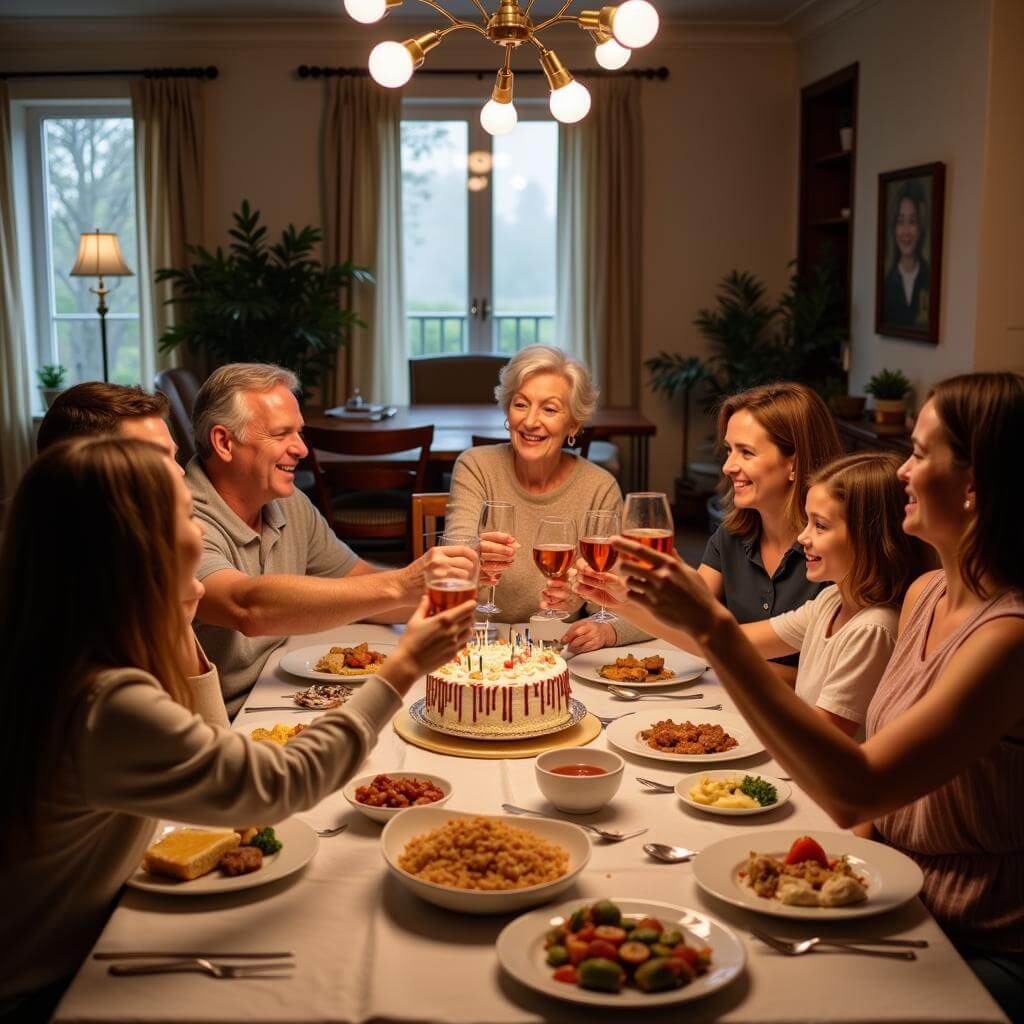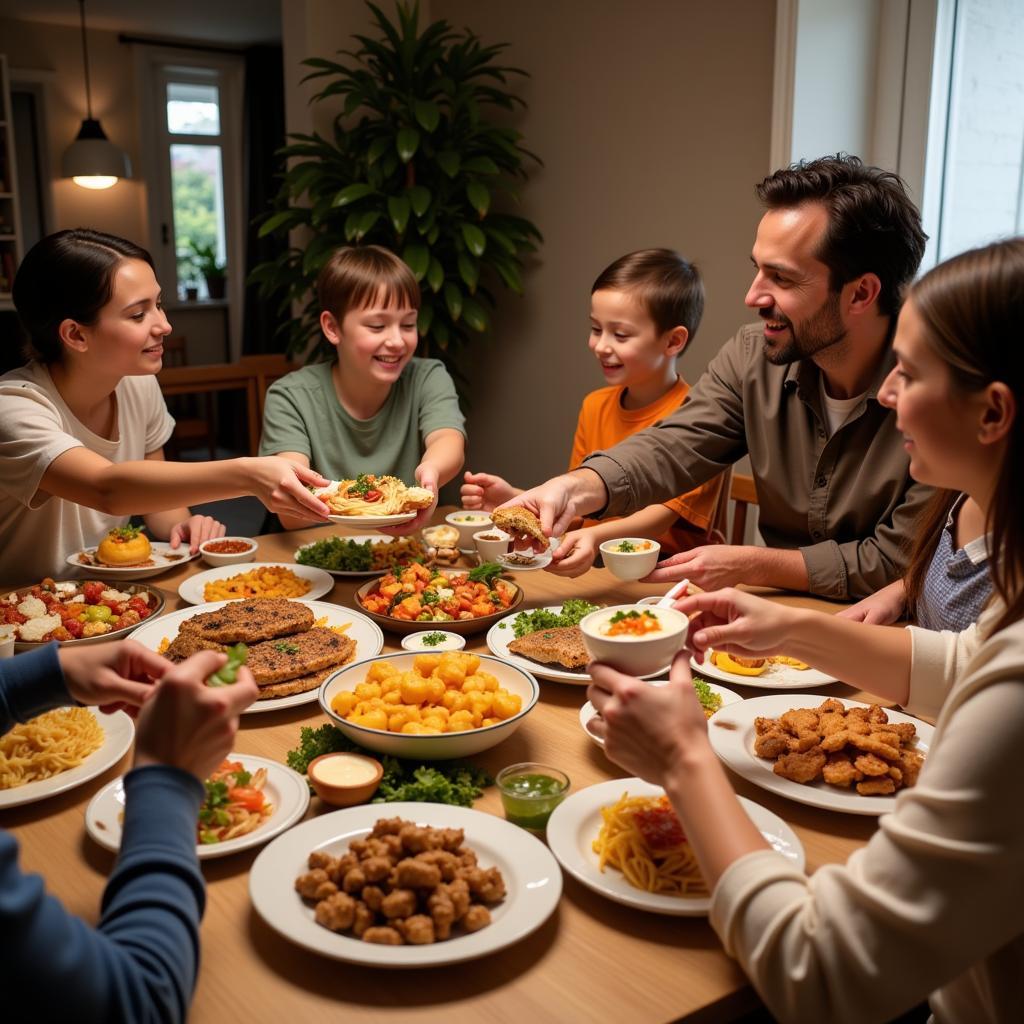The topic of describing a memorable family dinner is a popular one in IELTS Speaking tests, particularly in Part 2. It allows examiners to assess candidates’ ability to recount personal experiences, use descriptive language, and express emotions. This theme has appeared frequently in past exams and is likely to remain relevant in future tests. Let’s explore how to effectively answer questions related to this topic across all parts of the IELTS Speaking test.
Part 1: Introduction and Interview
In Part 1, you may encounter questions about family meals or dining habits. Here are some common questions and sample answers:
Q: How often do you have dinner with your family?
Band 6-7 Answer:
“I try to have dinner with my family at least three or four times a week. It’s a nice way for us to catch up and spend time together.”
Band 8-9 Answer:
“I make it a point to dine with my family virtually every evening. It’s not just about the meal; it’s an cherished ritual that allows us to bond and share the day’s experiences. Even on hectic days, we prioritize this family tradition.”
Part 2: Long Turn
Here’s a sample cue card related to the topic:
Describe a memorable dinner you had with your family
You should say:
- When and where it took place
- Who was present
- What you ate
- Why it was memorable
Band 6-7 Answer:
“I’d like to talk about a memorable dinner I had with my family last summer. It was my grandmother’s 70th birthday, and we all gathered at her house to celebrate. My parents, siblings, aunts, uncles, and cousins were all there – about 15 people in total.
We had a big feast with traditional dishes like roast chicken, mashed potatoes, and a variety of salads. The highlight was a beautiful birthday cake that my aunt had made specially.
This dinner was memorable because it was rare for our entire extended family to be together. We shared stories, laughed a lot, and even looked through old photo albums. Seeing my grandmother so happy made the evening really special.”
Band 8-9 Answer:
“I’d like to recount a truly remarkable family dinner that left an indelible impression on me. It took place last summer to commemorate my grandmother’s 70th birthday – a milestone event that brought our entire extended family together at her quaint, picturesque home.
The gathering was a veritable reunion, with my immediate family joined by aunts, uncles, and cousins from far and wide. We were a lively assembly of about 15 people, each bringing their unique energy to the celebration.
The culinary spread was nothing short of magnificent. We indulged in a sumptuous feast of traditional favorites, including a succulent roast chicken, creamy mashed potatoes, and an array of vibrant, fresh salads. The pièce de résistance was undoubtedly the exquisite birthday cake, a labor of love crafted by my talented aunt.
What made this dinner truly unforgettable was the rarity of having our entire extended family in one place. The evening was peppered with heartwarming stories, uproarious laughter, and a nostalgic journey through old photo albums. The joy radiating from my grandmother’s face as she was surrounded by her loved ones encapsulated the essence of family bonds and created a memory I’ll treasure for years to come.”
 Family celebrating grandmother's birthday dinner
Family celebrating grandmother's birthday dinner
Follow-up questions:
Q: What makes family dinners important?
A: Family dinners are crucial for fostering strong relationships and creating a sense of belonging. They provide a regular opportunity for family members to connect, share experiences, and offer support. These gatherings also help in passing down family traditions and cultural values to younger generations.
Q: How have family dining habits changed in recent years?
A: In recent years, there’s been a noticeable shift in family dining habits. With busier schedules and increased reliance on technology, many families find it challenging to coordinate regular meals together. However, there’s also a growing awareness of the importance of family time, leading some to deliberately prioritize family dinners as a way to counteract the isolating effects of modern lifestyles.
Part 3: Two-way Discussion
In this part, the examiner might ask more abstract questions related to family meals and traditions. Here are some examples:
Q: How do you think family meals contribute to society?
Band 6-7 Answer:
“I believe family meals are important for society because they help keep families close. When families eat together regularly, they communicate better and understand each other more. This can lead to stronger communities overall.”
Band 8-9 Answer:
“Family meals play a pivotal role in fostering social cohesion at the most fundamental level. They serve as a microcosm of society, where important values and norms are transmitted across generations. Regular family dinners cultivate effective communication skills, empathy, and mutual understanding, which individuals then carry into their broader social interactions. This ripple effect can lead to more harmonious communities and a more cohesive society as a whole. Moreover, the ritual of shared meals can act as a buffer against social isolation, which is increasingly prevalent in our digital age.”
Q: Do you think traditional cooking skills are being lost? Why or why not?
Band 6-7 Answer:
“Yes, I think traditional cooking skills are being lost to some extent. Many people are too busy to cook and rely on convenience foods. Also, younger generations often don’t learn cooking from their parents like they used to.”
Band 8-9 Answer:
“The erosion of traditional culinary skills is indeed a concerning trend in many societies. This phenomenon can be attributed to several factors, including the fast-paced nature of modern life, the ubiquity of convenience foods, and the diminishing practice of intergenerational knowledge transfer. However, it’s important to note that there’s also a countercurrent emerging. There’s a growing interest in artisanal and traditional foods, fueled by concerns about health and sustainability. This has led to a resurgence in cooking classes, food blogs, and TV shows dedicated to preserving and reviving traditional cooking methods. Whether this will be enough to stem the tide of lost culinary heritage remains to be seen, but it does suggest a growing awareness of the issue.”
Key Vocabulary and Phrases for High Scores
To elevate your speaking performance, incorporate these sophisticated words and phrases:
-
Culinary heritage /ˈkʌlɪnəri ˈherɪtɪdʒ/ (noun): The traditional dishes and cooking methods of a culture.
Example: “Our family dinners often celebrate our rich culinary heritage.” -
Convivial /kənˈvɪviəl/ (adjective): Friendly, lively, and enjoyable.
Example: “The atmosphere at our family dinners is always convivial.” -
To reminisce /ˌremɪˈnɪs/ (verb): To indulge in enjoyable recollection of past events.
Example: “During our meals, we often reminisce about family vacations and childhood memories.” -
Gastronomic delight /ˌɡæstrəˈnɒmɪk dɪˈlaɪt/ (noun phrase): A food or dish that is exceptionally enjoyable to eat.
Example: “My grandmother’s homemade pie is always the gastronomic delight of our family dinners.” -
To savor /ˈseɪvə(r)/ (verb): To enjoy or appreciate something to the full, especially by dwelling on it.
Example: “We like to savor not just the food, but also the company during our family meals.”
 Family sharing a meal with diverse dishes
Family sharing a meal with diverse dishes
Examiner’s Advice
To excel in the IELTS Speaking test, particularly when discussing topics like family dinners:
- Practice descriptive language: Use vivid adjectives and sensory details to bring your experiences to life.
- Develop your ideas: Don’t just list events; explain why they were significant or how they made you feel.
- Use a range of tenses: Incorporate past, present, and future tenses as appropriate to demonstrate your grammatical range.
- Include idiomatic expressions: Naturally integrate idiomatic language to show fluency and cultural understanding.
- Maintain fluency: Aim for smooth delivery, using fillers and linking words to avoid long pauses.
Remember, the key to a high score is not just in what you say, but how you say it. Confidence, natural delivery, and the ability to expand on your ideas will impress the examiner and boost your score.
For more practice on family-related topics, you might want to describe a recent family outing or describe a recent birthday celebration you enjoyed. These topics share similar themes and vocabulary, allowing you to further develop your speaking skills in this area.


